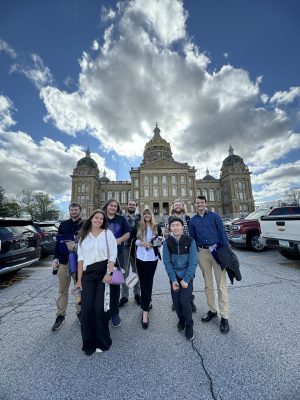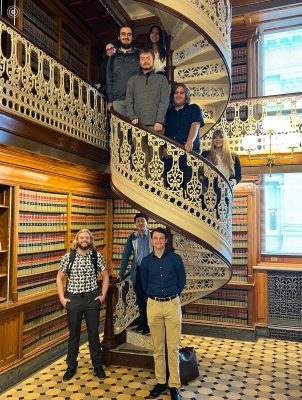Inside look at Iowa State Capitol brings classroom studies to life
With only One Course At A Time on their schedules for the day, it was easy for students in Politics 352: Parties and Interest Groups to travel to the Iowa State Capitol to see their studies come to life.

On Thursday, April 18, Assistant Professor of American Politics Megan Goldberg’s class went to Des Moines to assess the role of parties and interest groups in our democracy.
“The block plan was essential to making this trip happen,” Goldberg said. “Our schedule enabled us to stay at the legislature all day without students missing any other class, and we could also devote the first several days of the block to planning for our trip in a more intensive way.”
The course covers the historical development of the U.S. party system, starting in the 18th century through the modern day. Students also explore how interest groups emerged, how they influence the political system, and how they accrue power through lobbying and political action committees.
“This trip was a great way to see political parties and interest groups in action,” Goldberg said. “Our research tells us general patterns of how politics might work in the legislature, but getting to speak directly with those involved can illustrate the strengths and weaknesses of those theories and add a richness and human element to the course material you can’t necessarily get in the classroom.”
Iowa State Rep. Elinor Levin ’09 helped coordinate the trip. Highlights included watching the House of Representatives gavel in, meeting with Levin and State Rep. Cindy Golding, watching a debate in the house, and meeting with elections staffers to learn how parties and elected officials work together. The group also toured the Law Library and went to the very top of the Capitol rotunda with Iowa Rep. J.D. Scholten.
Throughout the day, they met with several Cornell alumni working at the Capitol, including Aubrey Kohl ’17, Kellie Paschke ’97, and Iowa Sen. Liz Bennett ’10.

“This was such a great opportunity to see alumni illuminate career paths in law and politics,” Goldberg said. “I think that when you are in the thick of coursework, it can be hard to imagine the path your life might take, but seeing alumni in action highlights how they might combine their different interests and how many options they have. I also hope that our students see that they are part of a large Cornell community that extends far beyond campus.”
Junior Aurora Elliott, who was enrolled in the class, said meeting Cornell alumni during this trip was inspiring.
“I heard from more than one alum that Cornell’s block plan was instrumental in preparing them for success in law school which reassured me that although the block plan can feel quite intense at times, the hard work and effort are necessary to prepare students for a lifetime of achievement,” Elliott said. “It was amazing to have Cornellians welcome us with open arms, guide us through our trip, and let us in on the more private inner workings of lawmaking. It truly felt like if they could make it in the system, then there’s no reason why I couldn’t do it too.”
They class also met with six different lobbyists from many different backgrounds.
“We got to meet lobbyists from the Iowa State Education Association, the Department of Veterans Affairs, and Common Good Iowa, as well as a few multi-client corporate lobbyists,” said first-year Kaden Legore. “Hearing them talk about how they work to represent their clients and interests was insightful. I think most would agree that the lobbying industry does not have a positive connotation, but getting to meet with these people helped soften the edges of an industry I was somewhat apprehensive about.”
For students, the whole experience allowed them to see what they were learning unfold right in front of them with lawmakers in Iowa. They learned a lot and were surprised by what they experienced.
“I think the most surprising part of the trip was discovering that making connections with representatives is the most consequential thing citizens can do to affect the laws,” Elliott said. “In alignment with some of the course material we’ve covered so far, the lobbyists agreed that forming stable personal connections with politicians had the biggest impact on their ability to exert influence politically, and the lawmakers agreed that the voters who consistently show up to make their voices heard made the biggest difference. The system we operate in is not closed-off: it was designed to be influenced by the electorate and I think we should all take advantage of that fact more often. Your voice matters and if you feel like it doesn’t, then maybe you aren’t using it enough.”



